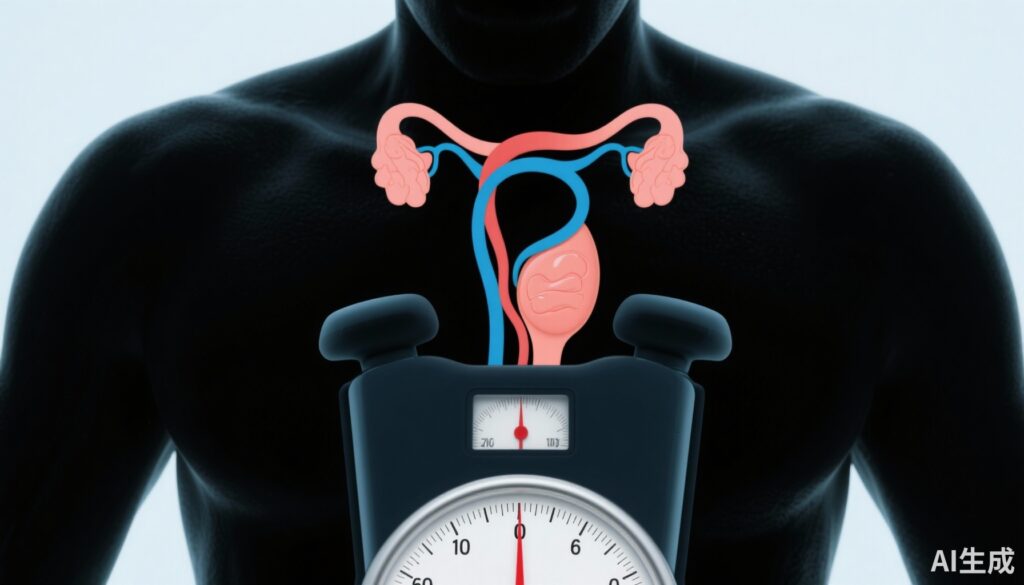Highlight
- Lifestyle interventions result in significant improvements in sperm normal morphology and progressive motility among men with obesity.
- Bariatric surgery and pharmacotherapy show limited or inconclusive effects on semen quality and male fertility outcomes.
- Most current evidence relies on semen analysis as a surrogate for fertility, with a paucity of data on conception and assisted reproduction outcomes.
- Substantial gaps remain in randomized controlled trials and exploration of pharmacologic agents like GLP-1 agonists on male reproductive health.
Background
Obesity is a globally pervasive and modifiable risk factor contributing to male factor infertility, a significant cause of couple subfertility. Excess adiposity induces hormonal dysregulation, systemic inflammation, and oxidative stress, all detrimental to spermatogenesis and sperm function. Clinical guidelines emphasize the maintenance of a healthy weight prior to conception, yet provide limited direction regarding specific interventions, or the amount of weight loss necessary to improve reproductive outcomes in men with obesity. Weight reduction strategies range from first-line lifestyle optimization—encompassing dietary changes and increased physical activity—to pharmacological treatment and bariatric surgery for severe obesity. However, the reproductive benefits and risks linked to these varied approaches remain inadequately defined.
Study Design
Peel and colleagues conducted a comprehensive systematic review and meta-analysis, registered under CRD 42022349665, encompassing English-language studies up to December 2024. The literature search spanned PubMed, Web of Science, Embase, Cochrane Central, and Scopus databases, targeting studies that involved reproductive-aged men (18–50 years) who underwent obesity interventions with documented weight loss. Included studies assessed reproductive parameters before and after intervention, primarily semen analyses, along with conception and assisted reproduction outcomes when available. The interventions evaluated were categorized into lifestyle modifications, pharmacotherapy (particularly metformin and liraglutide), and bariatric surgery. Meta-analysis was performed when at least two studies examined the same modality and reproductive outcomes comparably; meta-regression assessed the influence of weight loss magnitude when sufficient data existed.
Key Findings
The review incorporated 32 studies: 18 on bariatric surgery, 10 on lifestyle interventions, and 5 on pharmacotherapy (one study overlapped lifestyle and pharmacological arms).
Lifestyle Interventions
Ten studies (including five randomized controlled trials and five quasi-experimental designs) assessed lifestyle modifications such as diet and exercise. Meta-analysis demonstrated statistically significant improvements in sperm morphology (mean difference 0.59%, 95% CI 0.23 to 0.94) and progressive motility (mean difference 10.56%, 95% CI 8.97 to 12.15) post-intervention. These changes suggest that optimizing nutrition and physical activity positively influences sperm quality and potentially fertility.
Bariatric Surgery
Eighteen studies focused on bariatric surgery, largely quasi-experimental with few randomized controlled trials and some case reports. Meta-analyses comparing post-surgery semen parameters to controls found no significant improvements in sperm concentration, motility, morphology, or DNA integrity. Meta-regression incorporating weight loss degree also failed to show a dose-response benefit on semen quality. These findings indicate that although bariatric surgery achieves substantial weight loss, it may not translate into clinically meaningful improvements in sperm parameters, possibly due to rapid weight loss-related nutritional deficiencies or irreversible sperm dysfunction mechanisms associated with obesity.
Pharmacotherapy
Pharmacological interventions—predominantly metformin and liraglutide—were evaluated in five studies (four quasi-experimental and one case report). Data were sparse, heterogenous, and insufficient to conclusively determine their effects on semen quality or fertility endpoints. The impact of emerging agents such as GLP-1 receptor agonists remains underexplored and warrants future investigation.
Conception and Assisted Reproduction Outcomes
Across all modalities, there was a notable scarcity of data on clinical fertility outcomes like natural conception rates or assisted reproduction success. The reliance on semen analysis as a surrogate marker limits translation, since improvements in sperm parameters do not always correspond directly to enhanced fertility.
Expert Commentary
This synthesis highlights key insights and limitations in the existing literature on obesity interventions and male reproductive health. The positive effects of lifestyle interventions underscore the importance of sustained behavioral changes in improving male fertility metrics. Conversely, the neutral or inconsistent findings after bariatric surgery suggest the complexity of obesity-related sperm dysfunction and raise concerns about potential negative effects of rapid weight loss and malabsorption on semen quality. Methodological limitations—including small sample sizes, reliance on surrogate outcomes, and lack of randomized controlled designs—complicate definitive conclusions. Current clinical guidelines might consider emphasizing lifestyle modification as first-line infertility treatment in men with obesity, reserving surgical and pharmacologic approaches for weight-related comorbidities. However, high-quality trials evaluating fertility endpoints such as time to conception and live birth are essential.
Conclusions
Evidence indicates that lifestyle-based weight loss interventions modestly improve sperm morphology and motility in men with obesity. Bariatric surgery, despite significant weight reduction, does not consistently enhance semen parameters or DNA integrity, suggesting mechanisms beyond weight loss influence fertility. Pharmacotherapy data remain insufficient to recommend specific agents for fertility improvement. Critical knowledge gaps include the paucity of randomized controlled trials, minimal assessment of conception and assisted reproduction outcomes, and limited evaluation of newer pharmacotherapies like GLP-1 agonists. Future research should prioritize well-designed clinical trials with reproductive endpoints to inform evidence-based guidelines and optimize fertility management in men with obesity.
Funding and Registration
The study was registered under PROSPERO number CRD 42022349665. Funding details were not reported in the source publication.
References
Peel A, Lyons H, Tully CA, Vincent AD, Jesudason D, Wittert G, McPherson NO. The effect of obesity interventions on male fertility: a systematic review and meta-analysis. Hum Reprod Update. 2025 Oct 9:dmaf025. doi: 10.1093/humupd/dmaf025. Epub ahead of print. PMID: 41065428.



